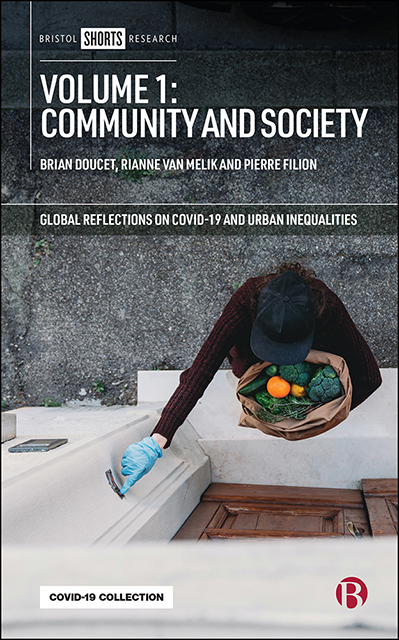Book contents
- Frontmatter
- Contents
- List of Figures and Tables
- Notes on Contributors
- Acknowledgments
- Preface to All Four Volumes of Global Reflections on COVID-19 and Urban Inequalities
- One Introduction
- Part I Working Practices
- Part II Life During Lockdown
- Part III Migration, Migrants, and Refugees
- Part IV Age, Race, Gender, and Ability
- Index
Eight - The Pandemic and Food Insecurity in Small Cities of the Global South: A Case Study of Noapara in Bangladesh
Published online by Cambridge University Press: 13 April 2023
- Frontmatter
- Contents
- List of Figures and Tables
- Notes on Contributors
- Acknowledgments
- Preface to All Four Volumes of Global Reflections on COVID-19 and Urban Inequalities
- One Introduction
- Part I Working Practices
- Part II Life During Lockdown
- Part III Migration, Migrants, and Refugees
- Part IV Age, Race, Gender, and Ability
- Index
Summary
Introduction
The unfolding economic and social consequences of the COVID-19 pandemic has exposed fault lines in existing food systems in both developed (Lawrence, 2020) and developing countries (Rahman et al, 2020). Bangladesh, a densely populated and rapidly urbanizing nation of roughly 180 million people went into a ‘general holiday with restrictions on movement’ (referred to internationally as lockdown) on March 26, 2020. The majority of economic and social activities within the country ceased as a consequence. The lockdown was eventually relaxed on June 1, 2020, with specific instructions to maintain social distancing. As of September 7, 2020, Bangladesh had 325,157 cases of COVID-19 and 4,479 people had died from the virus (Directorate General of Health Services (DGHS), 2020). A rapid-response research conducted by the Power and Participation Research Centre and BRAC Institute of Governance and Development of Bangladesh (Rahman et al, 2020) in April 2020 in Bangladesh observed a steep drop in income leading to a contraction in food consumption as evidenced by reduction in food expenditure by 28 percent for urban informal settlement respondents and 22 percent for rural respondents. Similar to experiences in other countries (Despard et al, 2020), the lockdown resulted in an income shock, particularly for the urban poor.
While there are reports of how communities in major cities have been impacted (Taylor, 2020), little is known about the lived experiences of residents in smaller cities and how food systems and food security in these towns were impacted. Indeed, small and mid-sized cities remain academically and professionally ignored and unexplored despite the fact that the world's urban majority reside in those cities (Satterthwaite, 2017; Ruszczyk et al, 2021). The relationship between food security, food systems, and sustainability also needs engaged consideration within these small cities (Mackay, 2019). Understanding this relationship is crucial because urban poverty and food insecurity are inter-related. Tacoli (2019) explains that most urban residents not only need to purchase the majority of their food but, unlike in rural areas, it is their main expenditure. Local governments in small cities also have curtailed capacity, minimal funding under their control, and often lack political power to fulfill their responsibilities. These pre-existing socio-economic conditions indicate that food security and food systems in small cities were also likely impacted by the pandemic-induced lockdown.
- Type
- Chapter
- Information
- Volume 1: Community and Society , pp. 83 - 92Publisher: Bristol University PressPrint publication year: 2021



